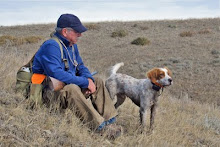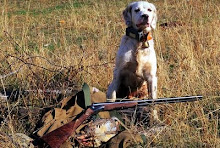 As is inevitable with new technology (what Ester Dyson would call 'disruptive technology') the collar mounted Garmin Astro tracking unit is stirring a lot of discussion and head scratching in field trial circles.
As is inevitable with new technology (what Ester Dyson would call 'disruptive technology') the collar mounted Garmin Astro tracking unit is stirring a lot of discussion and head scratching in field trial circles.Hunters love it. I love it. But field trialers are of mixed opinion. So here is the current situation as I understand it - along with my opinion and a few choice observations from others.
The major field trial organizations - AFTCA, American Field and AKC have all established maximum weight limits for electronic tracking aids. The reason for this is that they are concerned about collar mounted devices that would emulate the weight of an electronic training collar, which is banned for use in field trials.
These organizations have recently weighed in with decisions about the use of the Garmin Astro in the events that they sanction.
AFTCA - I spoke with Linda Hunt, Secty of the AFTCA, yesterday. She said that they will not allow the use of the Garmin Astro in their sanctioned amateur trials due to the receiver and collar exceeding the established maximum allowable weight. When asked if she had heard any philosophical arguments against the use of GPS tracking collars, she said no, it is just the issue of weight.
American Field - The AF has decided to allow the use of the Garmin Astro in OPEN stakes. The AFTCA and AF are usually closely aligned on these issues, and it is expected that the AF and AFTCA will try to 'get on the same page' during the annual Summer meeting of the Trustees.
Meanwhile, the new field trial website/blog, Strideaway, has weighed in with an editorial - The Best of Intentions, the Worst of Results. In the editorial the authors (unsigned, but I assume the primary blog authors - Chris Mathan and Mazie Davis - wrote the piece) put forth the idea that the GPS based device, beyond opening the door to abuse, would somehow undermine the sovereign principle of subjective judging.
American Field - The AF has decided to allow the use of the Garmin Astro in OPEN stakes. The AFTCA and AF are usually closely aligned on these issues, and it is expected that the AF and AFTCA will try to 'get on the same page' during the annual Summer meeting of the Trustees.
AKC - Has decided against allowing the Astro in their sanctioned trials, stating that the weight exceeds their allowable limit.A website has been established to petition for a reversal of the rulings of both the AKC and the AFTCA: Astro Petition website.
Meanwhile, the new field trial website/blog, Strideaway, has weighed in with an editorial - The Best of Intentions, the Worst of Results. In the editorial the authors (unsigned, but I assume the primary blog authors - Chris Mathan and Mazie Davis - wrote the piece) put forth the idea that the GPS based device, beyond opening the door to abuse, would somehow undermine the sovereign principle of subjective judging.
My response to the Strideaway editorial is that, minimalism and 'purity' would best be attained with just grounds, wild birds, dog, shoe leather, and handler. I understand the thrust of the argument, which is motivated by traditionalism and concern over the possible use of technology.
Planted birds,radio telemetry tracking collars, 4 wheelers, mounted scouts ... all these have made a departure from 'purity' and have added complexity to the game. Limiting the employment of technology at this point seems to be a little like acceptance of the idea that one can be a little bit pregnant.Is a GPS locating collar somehow less pure than a radio tracking collar? Does it really threaten to compromise judging or ethical handling? It's up to the club, participants, and the judges, isn't it?
I posted this thought on the Coverdog Trial BBS, Chris Mathan wrote:
I don't know how much judging you do Mike, but try if you can to put yourself in this position:
You have just judged an all-age championship with a large entry. You looked at many fine performances. You and your fellow judge made your decisions based on...what judges have based their decisions on since the beginning of field trial history. After the trial, an owner of a dog, make it three owners, march over to you, all three with their GPS receivers in hand. One guy's dog, according to the data, ran 700 yards (official all-age range!) to the front, (beautiful pattern on that LCD screen) and had two finds, the other two guys then show you their dogs' data and all three ask why their dogs didn't win. They are pretty mad and decide to post all this stuff on the internet on their favorite chat board. Do you think you will take the next judging assignment you're offered?
The editorial goes to some length to distinguish between the two technologies. The GPS collar can and will be matched to any number of hand-held devices which will be on even if the receiver the judge has is turned off. How could that be prevented? They are small and will get even smaller and more sophisticated in a short space of time. The exactness of the data and size of the handheld receiver will certainly make it easier if someone wants to cheat while scouting but the key issue is that it will gather data that should not be gathered in the first place. The editorial was written and posted on Strideaway because, regardless of what your feeling is about the GPS, the issue should be carefully considered. The GPS is a huge departure from what we currently use to safely retrieve a lost dog.
Frankly, if I were judging and someone showed me a Garmin Astro track of their dog's performance I'd disqualify their dog and toss them out of the trial... it's illegal to use an electronic tracking device in a trial. It may only be employed after a dog is declared lost and is 'out of judgement' and the judge is the only person allowed to carry the tracking unit.
A few sample responses in the same thread:
"The answer to the 3 wise men would be simple. Maybe your dog ranged further, or maybe it was faster but I could hardly look at your dog as It was braced with the winner. The winners running style, style around game, and everything about it totally outclassed the dogs you wise men are complaining about. Oh bye the way I will be judging again at Blankity Blank. You can stay home if you wish, as I will use my discretion again. And if the same thing happens, results will be the same." - J.M.
"...I agree that the use of GPS collars does raise some questions, and they do need to be addressed. I'm not even convinced that the GPS units should be allowed... But let's talk about the realistic issues that will arise, and not theoretical ones born out of misunderstanding of both the new and old technology. And while we are talking about real issues, I find it sad that the editorial fails to address the health and safety of the dogs we are running. The health of the individual dog is paramount to the theoretical health of the sport, is it not? " - D.Q.
People objecting to the use of GPS technology have not mentioned the main reason to employ such a device - the health and safety of our dogs. A number of dogs have been lost at trials - veering off course and crossing busy roads and being killed by automobiles, or by simple being lost and never retrieved. Anything that prevents this tragedy should be welcomed.
Field trials have a 130 year history in the United States. Tradition is a good thing, but must not blind us to aids that will help guarantee the safety of our dogs. There will be more said on this subject before the dust settles, but I believe that GPS technology will be allowed by all three major sanctioning bodies, and we will wonder what the argument was all about.









1 comment:
Mike: I think we do our dogs a disservice if we imagine that more than 5oz weight around the neck is enough to convince them that they are wearing an e-collar.
There's a reason that the AKC regulations state regarding tracking collars: "The collar surface adjacent to the dog shall have no protrusions." Because arguably, they know that dogs are smarter than we are, too.
Now I need to go weigh my dog's leather trialing collar with its monster Sunkhaze bell on it. I imagine it's going to come close to 5oz. Presumably that's why NSTRA also outlaws the use of bells.
best
A.
Post a Comment